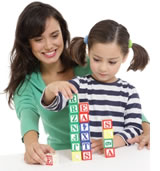
 Confident teachers
Confident teachersKey to improving preschooler's language and literacy skills
A new report published in American journal Teaching and Teacher Education suggests that preschool children may gain better language and literacy skills if they have teachers with high levels of confidence in their abilities.
However, in some cases students only saw gains when their teachers also had classrooms that emphasised emotional support for the children.
The study, which was co-authored by Ying Guo, a postdoctoral researcher in education at Ohio State University, examined how teacher confidence in their teaching abilities, what the researchers call self-efficacy, affected children's progression in language and literacy.
The research followed 67 teachers and 328 students over 30 weeks and was conducted across a variety of states in the USA.
Teachers were given a short questionnaire that measured their self-efficacy on a scale from one to five. The survey asked questions like "How much can you do to get through to the most difficult students?" and "How much can you do to keep students on task on difficult assignments?"
The level of emotional support in the classrooms was measured by trained coders who coded how teachers and students interact with each other from videotapes collected during a two-hour standardised classroom observation. The coders rated the quality as low, mid, or high based on a numbering scale from one to seven.
Students were given tests of language and literacy skills at the beginning and end of the 30 week period to assess improvement.
Results indicated that students whose teachers had high self-efficacy showed gains in one measure of early literary skills called print awareness, in which students were asked questions like "Show me just one letter on this page."
However, children only showed gains in vocabulary knowledge skills when they had a classroom that offered emotional support in addition to having a teacher with high self-efficacy.
"Classroom quality is important, and students seem to learn more when they have emotional support in the classroom," Guo said.
The study found that some of the factors that affected teachers' self-efficacy were level of qualification and years of experience. Teachers who possessed a primary teaching qualification had higher levels of self-efficacy than those who possessed a preschool teaching qualification.
While the data from this study can't explain why, the researchers speculate that the additional training needed for an elementary certificate may have led these teachers to be more confident in their teaching abilities than those with preschool certification.
An interesting result showed that teachers with more years of preschool teaching experience also had lower levels of self-efficacy, which is not uncommon according to Laura Justice co-author of the study and professor in the School of Teaching and Learning at Ohio State University.
"Fresh teachers who are straight out of training think that they can change the world. Then, when they get into the work place they realise how serious and difficult their jobs really are. This is why we think self-efficacy may decline among some preschool teachers through the years," she added.
Source: Ohio State University
© 2010 - All rights reserved
Care For Kids Internet Services Pty Ltd
ABN 55 104 145 735
PO Box 543 Balmain NSW 2041
privacy policy contact us